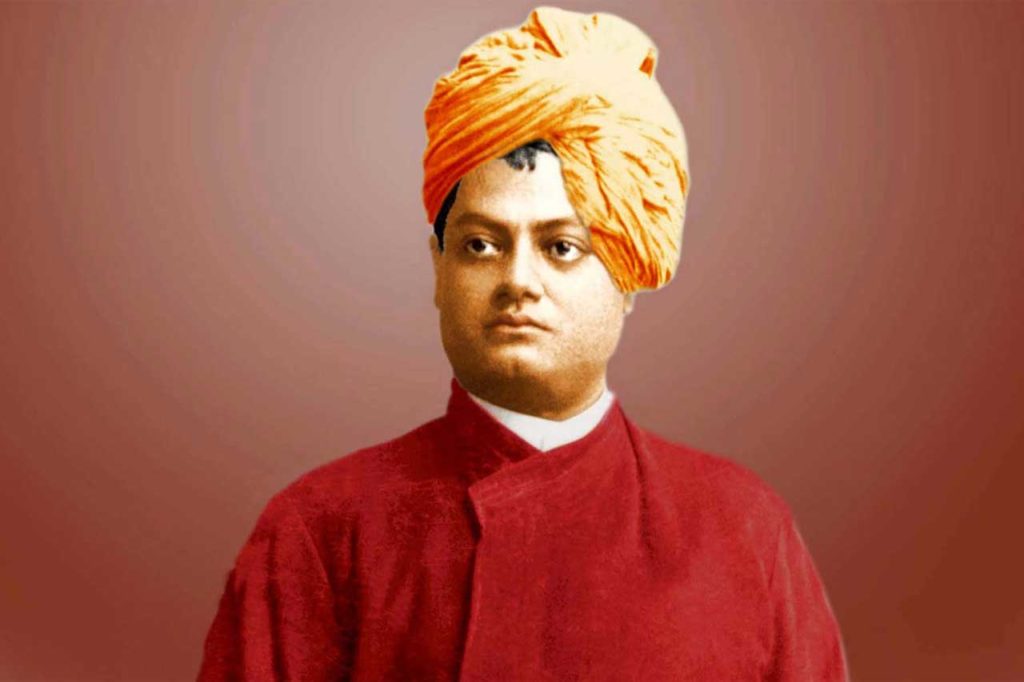Swami Vivekananda (1863-1902) was such a person who spent his entire time for the people, both in India and abroad. His life was for the society. He followed the ideology of his master Ramakrishna Paramahansa, who did not have the slightest hesitation in offering his time and attention to the most insignificant person. Ramakrishna did not own any thing. He could not withstand money. He was personification of ascetism. Yet he was not an ascetic in traditional sense of the term, but a householder. He showed how to carry out one’s life amidst mundane factors. Swami Vivekananda carried that very message to the mankind. Of course his style was a little different from his preceptor’s. But their basic philosophy and basic motto were the same. Society was the supreme for them. In India’s ancient scripture also it is said that one can sacrifice one’s family for the society. This was exactly what Swami Vivekananda did.
Notwithstanding his immense love for the humanity, Swami Vivekananda always pointed out the drawbacks in the attitude of people, especially those which compromised with the principle of egalitarianism. Equality was an aspect he valued very much. He appreciated Mohammedanism (Islam) for their equal treatment of all believers. He implicitly criticised the Christians for lacking in social equality. [The Complete Works of Swami Vivekananda (CWSV), 4th reprint, 1990, Vol 2, p. 371] According to him the basic premise of any religion is that “all men are equal”. [CWSV, Vol 6, p. 109] He did not find that in Christianity. He did not hesitate whenever he noticed any departure from the basic premises he followed.
Swami Vivekananda was more ruthless in criticism of his own countrymen, because the negativity and weaknesses of own countrymen hurt him more. We find many references in his writings to the weaknesses of the Indian people. But it was not that he saw only the negative aspects. He was in fact very proud of the spiritual heritages of India and he presented those to the West with great pride. The reference to the negativity arose only from the stress he laid on the necessity to reform and strengthen the nation. So we find mention of many social customs in his voluminous writings.
Swami Vivekananda was very objective in his analyses. He analysed the traditions of this great country, whether ancient or medieval, very rationally and objectively. He was very ruthless in the criticism of the demerits he found in any of these traditions. But he did not criticise for the sake of criticising, as many critics tend to do. It was his rationality and objectivity that made him a modern man. He termed even morality as a relative concept, subject to the need of the time period under consideration. He alluded to the practice of beef-eating in ancient Indian Hindu society in this context. This practice had been in vogue earlier, but gradually it became unacceptable in the Indian society. [CWSV, Vol 6, p. 109] At the same time he criticised the texts in religious scriptures as superstitions, even if it be in other religions, if it appeared untenable on rational logic. One such example was the narrative of Mohammed being taken to heaven by Angel Gabriel. He termed it as a hallucination. [CWSV, Vol 1, p. 184]
Swami Vivekananda was a great votary of equality. He was always for egalitarianism since he lived the life of a Sanyasin, in which life every one was necessarily equal. But he had an interesting explanation for the great inequality prevalent in all societies including India’s, in fact in all spheres of life. He termed inequality as a pre-requisite for creation. It was inequality that motivated people to achieve equality and hence it was at the root of all creation. He said that inequality was the very basis of creation. There would not be any creation if there was no inequality. It was a great motivating factor for different activities in the society. [CWSV, Vol 1, pp. 114-115] Such an objectivity is very rare among the religious leaders or reformers or philosophers, all of whom generally denounce inequality as an unwarranted phenomenon. But Swami Vivekananda brought out the positive side of inequality. In fact he was quite scientific in his analysis. Science also says that when an equilibrium is reached, there is no change from that state. If equality is attained, equilibrium is achieved, whence all activities will stop. Of course this is only a theoretical possibility as equality has hardly been achieved anywhere.
But Swami Vivekananda’s explanation of inequality acting as a catalyst of change in the society did not mean that he supported inequality. This is clearly seen from his analysis of the Chaturbarna system, which had created great inequality in Indian society. In this system, people in the society are divided into four broad groups Brahmana, Kshatriya, Baishya, and Shudra. In the past, this division was made on the basis of aptitude and profession. But later it turned hereditary and water-tight social divisions. The Chaturbarna system was earlier an occupational distribution. Swami Vivekananda categorically termed it as trade guild when he referred to the Chaturbarna system of ancient period. He refused to accept it as a religious institution. He went as far as to say that caste system was only an outgrowth of the political institutions of India. [CWSV, Vol 2, p. 515; Vol 5, p. 311] This criticism was made in spite of the fact that the Chaturbarna system was prescribed by the Vedas. Swami Vivekananda was well-aware of that. [CWSV, Vol 2, p. 508] This proves how modern he was. He was prepared to criticise even the holy Vedas. He went against the tradition laid down by the Vedas. He categorically declared caste as a social institution. [CWSV, Vol 5, p. 198]
Swami Vivekananda went to the extent of saying that the caste system was opposed to the religion of the Vedanta. [CWSV, Vol 5, p. 311] It was a training school for the undeveloped mind, he said. [CWSV, Vol 5, p. 305] So it was abundantly clear that he was dissatisfied with the nature and structure of the caste system and he believed that mature people should not subscribe to it. One must develop in one’s heart the feeling of the all-round good of all people irrespective of caste or colour, in order to achieve the real ideal of life, he said. [CWSV, Vol 7, p. 236] He considered the caste feeling as a barrier to one’s spiritual development.
Swami Vivekananda knew well that culture and education were the two tools that transformed society. So he asked people in the lowest echelon of the society to come up on their own strength, not by dint of any force of caste, because if any upward mobility takes place due to any internal force of caste, the validity of the discriminatory Chaturbarna system will remain there. He understood that only education could bring about social change. So the priviledge of education, which was confined to the higher echelons of the society, must be made available to the lower echelons too. He said that more money should be spent in educating the people of low castes than the people of high castes, who can educate themselves without help. [CWSV, Vol 3, p. 193] The education system in our country is still not open to all, except in the lower level of education. The higher education, which confers competence and skill to a young person, is still available only to the priviledged class equipped with resources, as higher education has been made very costly in the new scheme of things after liberalisation in the late twentieth century.
Swami Vivekananda always stressed on education. But his concept of education was not filling people’s brains with some facts only. He said that ideal of education was for one to achieve mastery over one’s own mind. [CWSV, Vol 1, p. 510] Clearly it was in the Upanishadic tradition of attaining self-control and realising the understanding of Tattvamasi. How relevant this concept is can be gauged from the fact that there are so much intransigence among the ‘educated’ people, who do not hesitate to harm one another for self-interest, not to speak of ill treatment. Lack of self-discipline has created havoc in the educated society. So Swami Vivekananda said that ‘intellectual education’ alone was not sufficient as it did not take care of the heart and made people selfish. He was very critical of the intellectuals who were heartless. He appreciated ‘the man of heart’ as such man could never be a devil. He said that whenever there was conflict between heart and intellect, one should follow heart. One should go beyond intellect, he said. [CWSV, Vol 1, pp. 412-413] Clearly he was not satisfied with the prevailing education system. All his dissatisfaction could be read in the above criticism. Ironically the ground of that dissatisfaction has not disappeared even now as criminal offence by educated people is even more common now.
Swami Vivekananda also advocated education for women. During his time, very few women were educated. He stressed that they should be educated and allowed to decide for themselves. It was not for the male society to decide what reform was necessary for women; it should be decided by women themselves. [CWSV, Vol 6, p. 115] He understood very well that education and social decision making were inter-related. It was education that endowed decision making power on one. He refered to a scripture by Hindu theoretician of ancient times, Manu, which enjoined upon people to educate their daughters equally as sons. [CWSV, Vol 5, p. 26] He appreciated the modern society for not following the scriptures which recommended child-marriage. He specifically asked his householder disciples not to marry off daughters at early age. He also said that there remained no difference between men and women in the highest reality of Parabrahman. [CWSV, Vol 7, pp. 218-219]
Swami Vivekananda was very critical of the prevailing education system as it was not a man-making education. Rather it was destructive in nature. [CWSV, Vol 3, p. 301] He was quite right on this point as the colonial education did not try to inculcate originality or creativity in the pupils. It was framed in such a manner that the rulers could get some persons to carry on the nitty-gritty of their administration mechanically. They did not want thinkers, original people. Swami Vivekananda went so far as to declare that the British controlled areas failed to produce any original person. [CWSV, Vol 3, p. 302] Of course it was a bit strong statement, but it conveyed his sentiment loud and clear.
Swami Vivekananda was hopeful of using education to remove class divisions in the society. He was an advocate of imparting education to the underpriviledged section. He criticised the educated section of the society of appropriating the fruits of the labour of the lower classes. A supporter of social equality, it was natural for him to ask the higher classes to help the lower classes in getting their legitimate rights. Education was for the masses, he said. But he was not talking this in an idealistic manner. He was very practical in this concept also. He said that the teachers (obviously from the higher classes) would also benefit in the process as their own poverty would be removed. [CWSV, Vol 7, p. 149] This implied that he was for commercialisation of education. He was not talking about free education. Coming from the mouth of an ascetic, it might sound strange. But that was Swami Vivekananda, unique and original, ahead of his time.
Swami Vivekananda thought about all sections in the society, even the householders. He was a man of the society. He never denounced householder lives in order to highlight the life of renunciation. For him every one was great in one’s own place. Duty of each was different. So one should follow one’s own duty. He had many valuable advices for the householders. He advised people of their roles, about how the parents should treat children, about how children should treat parents. He advised spouses to be loyal to one another. According to him, the householders should be Karma-Yogi or selfless workers. Moreover they should speak truth. Clearly he understood that untruth was at the root of all corruptions and problems in the society. [CWSV, Vol 1, pp. 42-51]
Swami Vivekananda had distinct opinion about the institution of marriage. He said categorically that “life to every one must be a compromise”. He noted that 99 % people had marriage as their ‘truest goal’. [CWSV, Vol 6, p. 372] Thus he accepted the life-style of the majority population and abstained from criticising people from his own perspective. Not only that, he went so far as to say that the institution of marriage was a form of renunciation just like social works, morality etc. [CWSV, Vol 6, p. 378] He pointed out in a subtle manner how the householders had to subjugate individual interests for the sake of family interests. Clearly it was a new interpretation of family life for the modern people, although it was already embedded in the teachings of Upanishadas and Puranas. Swami Vivekananda highlighted the importance of the institution of marriage as an important part of civilization. It was because if every man and woman were allowed freedom to take any woman or man as spouse, there would be chaos in the society and all-round evil effects. [CWSV, Vol 3, p. 408] Clearly he understood the social importance of the institution of marriage.
Swami Vivekananda spoke highly of status of women in society. He said proudly that women earned high honour and status in Indian society. The mother is the “centre of the family” here. Indian women enjoyed property rights since thousands of years and they inherited deceased husbands’ property. At the same time he was quick to point out that women in different societies did not necessarily feel unhappy over the low social status accorded to them. For instance he said that Mohammedan women were not unhappy even though their social and intellectual development were not so pronounced like their Western sisters. [CWSV, Vol 2, p. 506] Swami Vivekananda declared proudly that India was the land of Sita and Savitri. Indian women personified compassion, contentment and reverence, which were rare elsewhere. He did not hesitate to say that Western women were more like men and that feminine modesty as well as reserve were found in India alone. [CWSV, Vol 6, p. 491]
Swami Vivekananda laid great importance on every one performing one’s own duty. One should perform one’s duty without expecting any reward. Just as one performs one’s duty to one’s children without expecting any thing, similarly one should perform one’s duty to city, state etc also. Thus he preached the Karma-Yoga principle of Geeta. [CWSV, Vol 1, p. 59]
It was an important feature of Swami Vivekananda’s views that he considered the Eastern societies better than their Western counterpart, notwithstanding all the demerits he regularly pointed out among them. This was an important observation. His rationale of this observation was that the Eastern people were more merciful compared to Western people. This mercy extended to all beings, not only human beings. Moreover the attitude of renunciation is prevalent among all people in India, whom he implicitly took as an embodiment of Eastern philosophy. But at the same time he was a bit lenient to the Western society too, whose demerits were attributed by him to their nascent state. [CWSV, Vol 5, p. 306] He also made some practical comparison between Eastern societies and Western societies. He even pointed out some interesting features in the eating habits of both groups. [CWSV, Vol 5, p. 504] This amply proved his keen observation of habits in different societies.
Regarding the American society, Swami Vivekananda’s view was that they thought too much of money and gave less importance to every thing else. He said explicitly that they had a lot to learn. But he made a positive comment that they would be wiser over time as their nation grew old. [CWSV, Vol 2, p. 479] Moreover he praised Western society as equipped with greater freedom than Indian society. But again he gave preference to Indian society in the context of religious freedom, which was lacking in West according to him. [CWSV, Vol 2, p. 115] He did not have high opinion about the Christian missionaries coming to India to preach religion. Though he was a religious preacher, he was more of a reformist. He explicitly said that India needed bread more than religion. He declared that it was an insult to offer religion to starving people. He understood the terrible economic plight of the people at that time. He said that in the context of Christian missionaries who preached religion among the poor Indians. [CWSV, Vol 1, p. 20]




